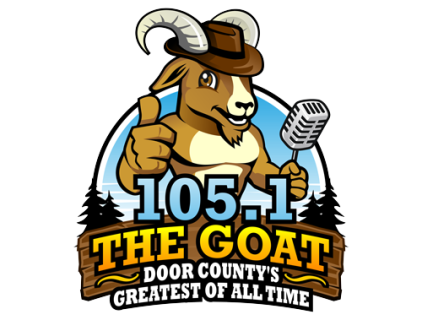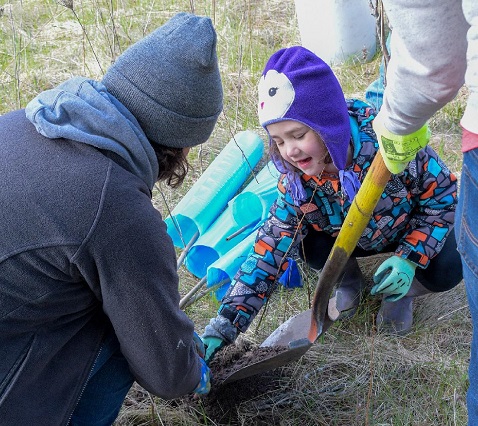This week at Crossroads, our public programs focus on under-appreciated, but essential components of our environment: biodiversity, fungi and dark skies.
On Saturday, May 11, the Crossroads Habitat Healers will plant native tree seedlings at the Crossroads Workshop starting at 9:00 a.m. The same day, the Door Peninsula Mushroom Club will be in the Collins Learning Center presenting the 2nd Annual Mushroom Day, which will run from 10:00 to 3:00 p.m.
At the Stonecipher Astronomy Center, on Tuesday, May 14 at 7:00 pm, the program at the Door Peninsula Astronomical Society (DPAS) will be “Dark Skies and Wildlife.”
We at Crossroads are guided by the words of Aldo Leopold who wrote, “The land ethic simply enlarges the boundaries of the community to include soils, waters, plants, and animals, or collectively: the land... In short, a land ethic changes the role of Homo sapiens from conqueror of the land-community to plain member and citizen of it.”
While Leopold was a passionate advocate for planting trees, he did not write much about biodiversity, fungi, and dark skies….probably because, when he was alive, we were not yet aware of their importance.
Planting a variety of native trees and shrubs is an extremely effective way to enrich the environment for birds and other wildlife. Dr. Douglas Tallamy explains, “Understand that moths and butterflies and many of our insect pollinators lay their eggs in the leaves of native trees.”
Almost all of our songbirds feed their young exclusively with fat juicy caterpillars. Without a variety of native plants, we would not have a variety of caterpillars. And without a variety of caterpillars, we will not have a variety of nesting birds. If we want nesting birds in the yard, we need a variety of native trees.
Trees and shrubs take simple chemicals from the ground and air, and using the energy of the Sun, through the process of photosynthesis, combine these chemicals into the compounds which make up wood.
After a tree dies (and sometimes it is still alive), fungi take apart the chemical compounds, feed on the carbohydrates, and break down the wood into simple chemicals.
Fungi are not plants nor are they animals. Rather, fungi are living organisms belonging to their own kingdom. There are countless kinds of fungus, all of which probably are more closely related to animals than to plants because they cannot manufacture food.
Some can be harmful. Truly remarkable, the mycorrhizal fungi that have a symbiotic relationship with the roots of many plants are extremely beneficial. Other fungi feed on dead (and sometimes live) trees and other plants and animals.
Just as apples contain the seeds which will grow into new apple trees, many fungi have fruiting bodies called mushrooms which contain the spores which grow into new fungi.
Most fungus spores blow around and fall in places where they cannot grow. But the spores that fall on dead wood can grow. As they grow, feeding on the sugars manufactured in green leaves, fungi decompose the wood, turning it back into simple chemicals. They help dead trees break down and put chemicals back into the soil—recycling!
Door Peninsula Mushroom Club will hold its 2nd Annual Mushroom Day to celebrate these remarkably varied fruiting bodies we call mushrooms with guided hikes, lectures, demonstrations, and vendors. Whether you are a seasoned mycophile or just curious about the magical world of mushrooms, this event is for you! And it is free and open to the public.
Research scientist Christopher Kyba wrote that for nocturnal animals, “the introduction of artificial light probably represents the most drastic change human beings have made to their environment."
But how on Earth could limiting artificial light at night help protect wildlife? At the May meeting of the Door Peninsula Astronomical Society, Coggin Heeringa will present the program “Dark Skies and Wildlife” and will review emerging research pertaining to the negative effect of artificial light on plants and insects and, by extension, wildlife. The program is free and open to all. Weather permitting, we will open the observatory for night sky viewing.
Spring has sprung. Visit Crossroads by day to see wildflowers and in the evening to hear the frog chorus and see dancing woodcocks. The trails are open all day, every day, free of charge.
Saturday, May 11
10 am to 3 pm 2nd Annual Mushroom Day
Enjoy visiting mushroom-related vendors. Engage in indoor and outdoor mushroom activities, hear informative lectures and learn about wild mushrooms and how to cultivate your own at home. Whether you’re a seasoned mycophile or just curious about the magical world of mushrooms, this event is for you!
Collins Learning Center, Crossroads, 2041 Michigan, Sturgeon Bay
9:00 Habitat Healers: Seedling Tree Plantings
This week Habitat Healers (Crossroads volunteers) will be planting tree seedlings! Wear clothing and footgear that can get dirty and wet and bring a water bottle. Instruction, equipment, and gloves provided along with cookies and lemonade at the end! There is no need to register in advance and all ages are welcome. Meet at the Workshop at 2041 Michigan Street, Sturgeon Bay.
Tuesday, May 14,
7:00 Meeting of the Door Peninsula Astronomical Society
Visitors are encouraged to attend the monthly meeting of DPAS. Coggin Heeringa, will present the program, “Dark Skies and Wildlife” will interest people who love astronomy and naturalists. Weather permitting, a viewing night will follow the meeting. Meet at the Stonecipher Astronomy Center, 2200 Utah in Sturgeon Bay.






